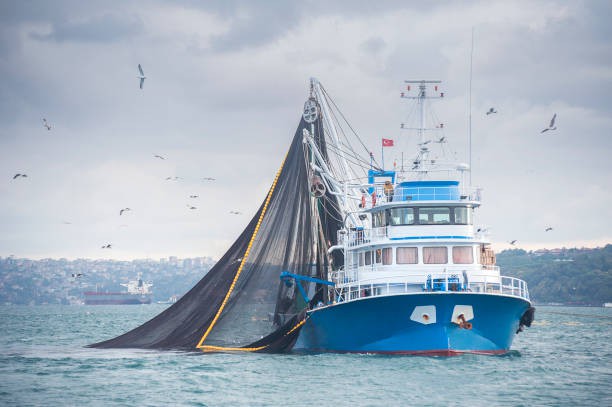
Fishing is a centuries-old tradition, and over the years, fishermen have developed a variety of tools and techniques to help them catch more fish. One such tool is the fishing vessel, which allows fishermen to access deeper waters and more remote fishing grounds. In this article, we'll take a look at the different types of fishing vessels available, their uses, and the benefits they provide.
Types of Fishing Vessels
1. Trawlers
Trawlers are large, powerful vessels that drag a large net behind them to catch fish. These vessels are designed to work in all kinds of weather and can stay at sea for long periods of time. Trawlers come in a variety of sizes, from small vessels used for inshore fishing to large ocean-going trawlers that can catch fish hundreds of miles offshore.
2. Longliners
Longliners are vessels that use a long line with baited hooks to catch fish. These vessels are often used for deep-sea fishing, and they can catch a variety of fish, including tuna, swordfish, and marlin. Longliners are typically smaller than trawlers and are designed to operate in rough seas.
3. Gillnetters
Gillnetters use a large net with small holes to catch fish. The net is set vertically in the water, and fish swim into the net and get caught. Gillnetters are often used for inshore fishing, and they can catch a variety of fish, including salmon, herring, and mackerel.
4. Purse Seiners
Purse seiners use a large net to encircle a school of fish, and then the bottom of the net is pulled closed like a drawstring purse, trapping the fish inside. Purse seiners are often used to catch large schools of tuna, sardines, and herring.
Benefits of Fishing Vessels
1. Access to Remote Fishing Grounds
Fishing vessels allow fishermen to access remote fishing grounds that would otherwise be inaccessible. This means that they can catch more fish and provide a greater supply of seafood to consumers.
2. Increased Efficiency
Fishing vessels allow fishermen to catch more fish in less time. This means that they can bring more fish to market and meet the demands of consumers more effectively.
3. Improved Safety
Fishing vessels are designed to be safe and seaworthy in all kinds of weather conditions. This means that fishermen can work in challenging environments without putting their safety at risk.
Conclusion
Fishing vessels come in all shapes and sizes, and each type has its own unique benefits and uses. Whether you're a commercial fisherman looking to catch large schools of tuna or a recreational fisherman looking to explore remote fishing grounds, there's a fishing vessel that's right for you. By investing in a high-quality fishing vessel, you can increase your efficiency, improve your safety, and provide a greater supply of seafood to consumers.
Choosing the Right Fishing Vessel
When choosing a fishing vessel, there are several factors to consider, including the type of fishing you'll be doing, the size of the vessel, and your budget. Here are some tips to help you choose the right fishing vessel for your needs:
1. Determine the Type of Fishing You'll be Doing
Different types of fishing vessels are designed for different types of fishing. If you'll be catching large schools of tuna or other pelagic fish, a purse seiner might be the best choice. If you'll be catching bottom-dwelling fish, a trawler might be a better option. Consider the type of fishing you'll be doing and choose a vessel that's designed for that purpose.
2. Consider the Size of the Vessel
Fishing vessels come in a variety of sizes, from small boats that are ideal for inshore fishing to large ocean-going vessels that can stay at sea for weeks at a time. Consider the size of the vessel you'll need based on the amount of fish you'll be catching and the distance you'll need to travel to reach your fishing grounds.
3. Determine Your Budget
Fishing vessels can be expensive, so it's important to determine your budget before you start shopping. Consider the cost of the vessel, as well as any additional expenses, such as fuel, maintenance, and insurance.
4. Look for a Reliable Dealer
When buying a fishing vessel, it's important to work with a reliable dealer who has experience in the industry. Look for a dealer who specializes in fishing vessels and has a good reputation in the industry.
Conclusion
Fishing vessels are an important tool for fishermen, allowing them to access remote fishing grounds and catch more fish in less time. By choosing the right fishing vessel for your needs and working with a reliable dealer, you can increase your efficiency, improve your safety, and provide a greater supply of seafood to consumers. Whether you're a commercial fisherman or a recreational fisherman, investing in a high-quality fishing vessel can help you achieve your goals and succeed in the industry.
Dredgers are important machines used for excavation and land reclamation in water bodies. They come in different shapes, sizes, and types, depending on the specific purpose they are designed for. I....
Pilot boats play a vital role in ensuring the safety and efficiency of maritime transportation. These boats are designed to transport pilots to and from ships that require their expertise in navig....
Self-propelled barges are vessels that are designed to transport large quantities of cargo on inland waterways. These barges are propelled by their own engines, making them highly efficient and cos....
Barge/ Dumb Barge A barge is a flat-bottomed boat that is designed to transport goods or people on inland waterways or near-shore locations. Dumb barges, also known as unpowered barges, are t....